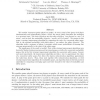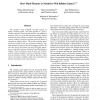48 search results - page 2 / 10 » The Winning Ways of Concurrent Games |
STOC
2001
ACM
14 years 5 months ago
2001
ACM
We consider two-player games played for an infinite number of rounds, with -regular winning conditions. The games may be concurrent, in that the players choose their moves simulta...
CORR
2008
Springer
13 years 5 months ago
2008
Springer
We consider concurrent games played on graphs. At every round of the game, each player simultaneously and independently selects a move; the moves jointly determine the transition ...
ECCC
2008
13 years 5 months ago
2008
In a two player game, a referee asks two cooperating players (who are not allowed to communicate) questions sampled from some distribution and decides whether they win or not base...
FSTTCS
2008
Springer
13 years 6 months ago
2008
Springer
We survey determinacy, definability, and complexity issues of Banach-Mazur games on finite and infinite graphs. Infinite games where two players take turns to move a token thro...
LICS
1997
IEEE
13 years 8 months ago
1997
IEEE
We consider a class of infinite two-player games on finitely coloured graphs. Our main question is: given a winning condition, what is the inherent blow-up (additional memory) of ...


